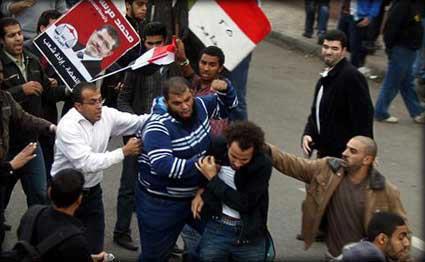On the Political and the Personal. Or, How to Retain a Sense of “Humanity” in Egypt? Part 2

Dr Vivienne Matthies-Boon is currently in Cairo. In this continuation of her previous post, she shares with us some of her experiences and reflections on the ongoing conflict between pro-democracy campaigners and supporters of the Muslim Brotherhood.
In the previous post, I briefly outlined the political, violent, situation of the clashes here in Cairo. In this second part of the blog, I want to relay the more personal dimension of the current situation here in Egypt – which are harder to express, not only because it is overshadowed by the sheer scale of the political conflict but also because in a sense this personal dimension is less tangible. It is, after all, personal. Being in Cairo at the moment, it seems as if there is no other world outside of Egypt – life here is dominated by the current political crisis. Of course, in a sense, life also goes on as ‘normal’ in the areas of Cairo not directly affected by the current clashes: taxis make their way through Cairo’s chaotic traffic, ta’amiyya and foul is being sold in take away outlets, and tea and coffee is served on the Caireen streets. Yet, beneath the thin veneer of normality, society is highly politicised – and increasingly polarised between the Islamists and non-Islamists. This polarisation was already apparent prior to Wednesday’s violence, as opposition to the Presidental constitutional declaration grew.
For example, even on Saturday (before the current clashes), my taxi had barely made its way out of the airport vicinity, when it stopped to pay toll and the driver was asked by the toll officer whether he was pro- or anti-Morsi. When the taxi driver answered he was pro-Morsi, the officer jokingly told him he was not going to go open the barrier and that the driver would have to spend a long night waiting. Fortunately, this was only a joke. But a joke that nevertheless gives us a small glimpse of the politisation of society. Another example: in the supermarket the other day, the attendant asked the guy behind me in the queue what his opinions were on Morsi’s declaration, as the guy behind me looked like an Ikhwani (Muslim Brother) and the attendant made it clear he was pro-Morsi.
But also amongst my direct friends and colleagues, the dominant topic of is the current political situation. And, whilst they try and carry on with their daily jobs, daily routines, the conflict in fact penetrates very deeply into their lives. This is not surprising. After all, they attend marches late into the night, see close friends beaten up, shot at, killed, tortured or otherwise maimed. They are shouted at and verbally as well as physically abused. They are pulled into torture chambers and molested. Field hospitals are set up to treat the wounded. The physical but also mental and emotional impact is enormous. It is thus not surprising then to see friends and colleagues struggling to continue their work, studies and other obligations during the day. They have clearly not slept for days, smoke 4 packs of cigarettes a day, are unable to concentrate and work, forget to take showers, monitor the news as well as their mobile phones at all times etc. At the same time, despite the clear fatigue on their faces, I also see a huge resilience – an internal strength that is so powerful – as they prepare for demonstration after demonstration after demonstration. There is a real commitment: they will continue to fight for their rights and a better future for Egypt. They will not accept Morsi’s dictatorial measures, nor will they accept the same old dictatorial tricks – which portray the opposition as a destabilising force for the country, as thugs, as feloul (remnants of the old regime). And I truly hope the resilience of Egyptians will deliver the dignity – that sense of humanity – that they so desire and deserve.

